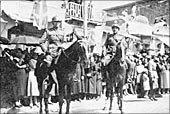 |
||||
|
||||
 |
| Social movements
The emergence of social movements of a new type is characteristic of this period. Female emancipation could be singled out as one example which - albeit with limited impact - started to make its presence felt in areas such as active intervention in the field of employment. Until then women were not protected by the existing legislation, while their wages ranged between 1/2 and 1/3 of those of their male colleagues. At the same time, the international climate, as well as the unionized organization of women, for the first time rendered realistic the demand for conferring political rights on Greek women (February 1930). |
||


